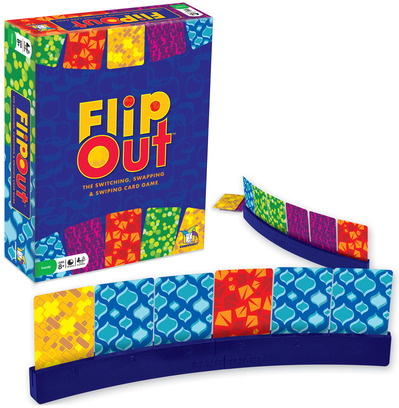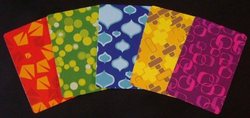 Review: FlipOut - Hey, Don't Mind if We Do!
Review: FlipOut - Hey, Don't Mind if We Do!

FlipOut from Gamewright is a recent re-release of a title previously known as Patchwork designed by Daniel Weaver back in 2008. FlipOut is a family game meant for 2-5 players, ages 8+, and takes about 15 minutes to setup and play. I am not familiar with the original version but from what I have gathered from my research, the only difference between the original and the Gamewright release are the holders. The holders are made of wood and are one solid piece in Patchwork; whereas in FlipOut they are plastic and separated into two pieces for easier storage. A special thanks goes out to Gamewright for supplying a copy for review!
The Game
FlipOut is a pattern matching game where players switch, swap, and flip cards in order to create matches of 4, 5, or 6 cards. To do this, players take two actions per turn, in which the following can be performed (taken from the rules):
- Flip: You can flip a card around in any holder (yours or an opponent's), so that the back (outside) becomes the front (inside).
- Switch: You can switch the position of two cards in your or any other player's holder.
- Swap One: You can swap any one of your cards with another player's. To swap, take (or request by number) any one card from another player's holder and replace it with one from yours.
- Swap Two: You can swap two adjacent, same-color cards from your holder with two adjacent, same-color cards in another player's.
- Score: Collect a set from your holder. This must be a set of 4, 5, or 6 cards.
- Swipe: Collect a set from an opponent's holder, and as with the Score action, it must consist of 4, 5, or 6 cards.
When a player performs the Score or Swipe action, they take the cards off of their holder or opponent's, place them in their scoring pile and refills their holder up to a total of 6 cards. If a collection is gained through a Swipe action off another player's holder, then that player receives one card from the collection. The game ends when the draw pile does not contain enough cards to refill a holder back up to the required 6 card total. At this point anyone with an uncollected set in their holder is able to take that collection and then the scoring piles are added up. The winner is the player with the most cards in their scoring pile.
Game Pieces
There's not a whole lot to this game. There are 5 plastic holders which come in two parts and attach in the middle and are numbered from 1-6 for slot reference when requesting actions on another player's holder. Then there are the 90 double-sided cards which have will have one of the five patterns on each side. The patterns and colors on the cards are very distinct which makes this game great for the color blind.
The first thing I noticed after opening the box is the smell; it's hard to describe. A good example would be the new shoe smell. Most everyone knows that new shoe rubber smell is guaranteed when purchasing a new set of sneakers. Many people enjoy the smell, others can't stand it; FlipOut has one of those smells to it. It's from a polyurethane-like coating on the cards. It's pungent and sticks to your hands after playing a round. I personally do not mind the smell, but most of the people that I have played with didn't like it. It wasn't strong enough to discourage them from playing or caused them to enjoy the game any less, but was noticed by everyone. Also, this coating can make it difficult to shuffle the cards and when you take into account that there are 90 of them, shuffling can become a bit bothersome. If you split the deck and work between two people, it's not bad.

Game Play
FlipOut is a deceptively simple game to teach, learn, and understand. It plays well with 2 players and even better with more. The strategies change up a bit depending on how many players you have. When I was playing against one other player it seemed like swiping cards off their holder was a more efficient action, even if they keep one of the collection, as it disrupts any set they might be working on. Also the games tend to be more lopsided so losing a few cards to a Swipe action is insignificant. However, when playing with more people, the games are much closer, so every card can be significant. So working on your own holder feels more profitable than working to disrupt another player.
Since the game is so simple, there isn't a whole lot of depth to the game, which is good and bad. It is good as this fits with being a family game. It is bad as it lacks the depth to keep it as the main game of a gaming night. FlipOut is also a very quick game, which allows for a quick succession of plays. It works great for a starting game, in-between larger games, or a great finisher.
Final Thoughts
I really enjoyed playing FlipOut. It is a quick, easy, and extremely fun card game that forces you to plan ahead, react and change strategies on the fly. It is a family and color blind friendly title that helps teach pattern recognition, memory, and strategic decision making. It is simple enough for children and yet fun enough for adults. It's uniqueness is also another great selling point. Chances are you don't have anything that plays like FlipOut; well that is, of course, unless you already have Patchwork, Daniel Weaver's original release.
At FlipOut
Read More in: Card Games | Our Game Reviews
Share this Article with others: 
Related Articles:
Came straight to this page? Visit Critical Gamers for all the latest news.
Posted by Critical Gamers Staff at May 8, 2011 11:37 AM
